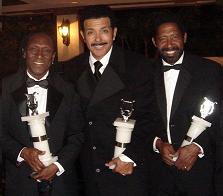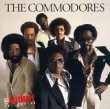The Commodores
The Commodores
Available Music
| Song of the Month - Darnell Kendricks - "What a Wonderful Night" |
| Choice Cut - Christian de Mesones feat. Nes Powers - "Stay" |
| Video of the Month - Helen Bruner and Terry Jones - "You Got Me Feeling" |
| Listen Now! - The Fresh Soul Playlist |

 2006 was a big year for the Commodores. They began working on a new studio album with longtime producer James Anthony Carmichael and were selling their live concert DVD. They were also named winners of Heroes and Legends award, as presented by the HAL Foundation, an organization designed to help "at risk" youth reach their potential in the performing arts.
2006 was a big year for the Commodores. They began working on a new studio album with longtime producer James Anthony Carmichael and were selling their live concert DVD. They were also named winners of Heroes and Legends award, as presented by the HAL Foundation, an organization designed to help "at risk" youth reach their potential in the performing arts. 

